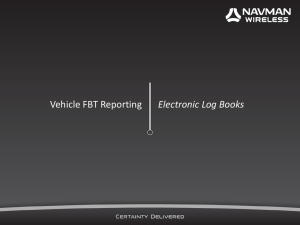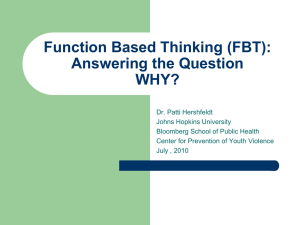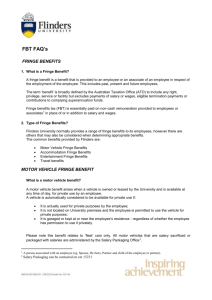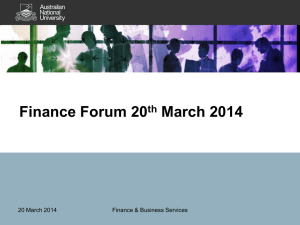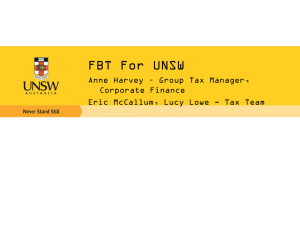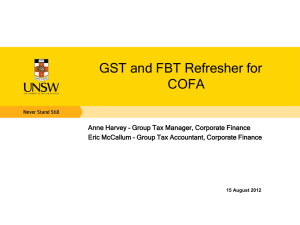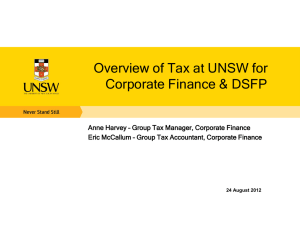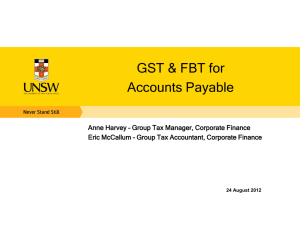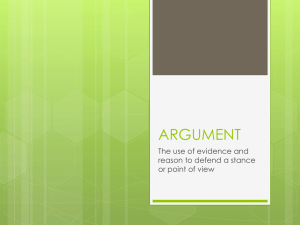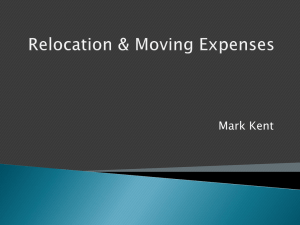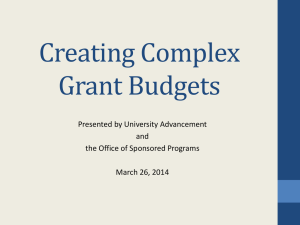FBT Training
advertisement
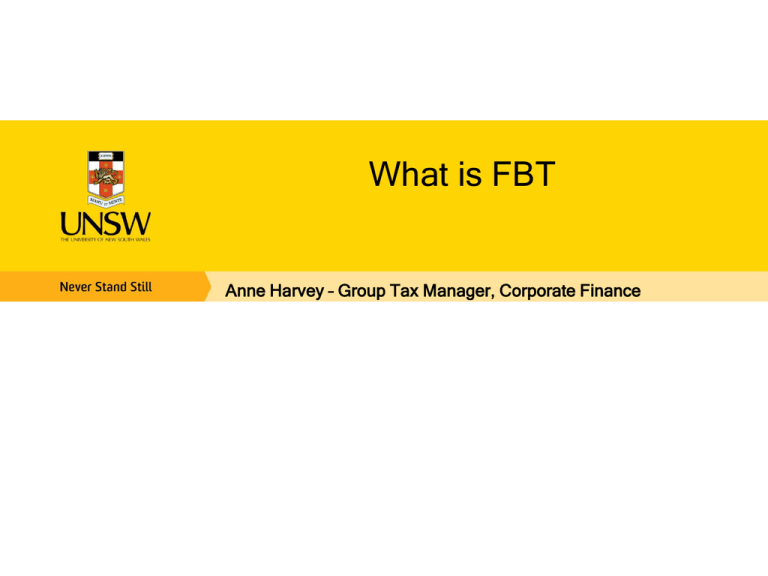
What is FBT Anne Harvey – Group Tax Manager, Corporate Finance Objectives • • • • • • • What is FBT What does Taxable Value mean How is FBT calculated Types of benefits which attract FBT When is FBT charged Update on LAFHA Reforms Understand Reportable Fringe Benefits Fringe Benefits Tax - Facts FBT year 1 April to 31 March Tax Rate 46.5% - Calculated on Grossed Up Taxable Value FBT paid by employer – UNSW Includes benefits under a salary sacrifice arrangement Reportable Fringe Benefit included on Payment Summary in June, if > $2000 FBT is tax on benefits (right, privilege, service or facility) provided to employees & associates (relative, partner/ spouse, child) by an employer, associate of employer or under an arrangement with a third party in respect of employment – reward for service “Employee” includes current, former and future employees If pay Salary PAYG deduction Employee pays tax If provide fringe benefit no PAYG deduction Employer pays tax FBT Calculated on Taxable Value What is Taxable Value Determined by the rules applying to each category of fringe benefit Generally the cost of the benefit Some benefits concessional tax, e.g. Motor Vehicles Some reductions and exemptions provided in legislation GST Impact • Taxable Value based on GST inclusive amount • FBT payable depends on whether entitlement to ITC credit • Can claim Input Tax Credit for GST paid Important correct GST codes are used and GST amount is correct. FBT Calculation Type 1 Entitlement to ITC Gross Up rate 2.0647 Type 2 No entitlement to ITC Gross Up rate 1.8692 Taxable Value – incl GST $1000.00 Taxable Value - no GST * Gross Up rate Grossed up TV FBT rate FBT cost * Gross Up rate Grossed up TV FBT rate FBT cost 2.0647 $2064.70 46.5% $960.09 $1000.00 1.8692 $1869.20 46.5% $869.18 PRT = $1000 * 1.8692 * 5.45% (NSW PRT rate) = $101.87 Types of Fringe Benefits UNSW applicable • • • • • • • • • Car – available for private use Expense reimburse expense to employee pay third party for expense incurred by employee Property Provide free or discounted property Debt waiver – forgive employee’s debt Loan - charge no or low interest Housing - right to use accommodation and usual place of residence Living Away From Home Allowance Residual – not fit a specific category Tax-exempt body entertainment Non UNSW • Car Parking – at or near work and commercial parking station within 1km that charges fee for all day parking which above threshold. (Exemption for Educational Institution in legislation) • Entertainment (Tax-exempt body entertainment applies) • Airline transport - airline employees/ travel agents; free or discounted stand by travel • Board – accommodation and entitlement to 2+ meals a day. Remote construction, oil rig, resident teacher at boarding school. Examples of Benefits Incurring FBT • • • • • • • • • • • • • • Salary packaged Motor Vehicles or UNSW provided – personal use. Medical Insurance - inpatriates Permanent Residency – application, police & medical checks, lawyers fees (Exempt if to enter Australia on relocation) Gifts, awards and prizes - $300 or more Travel for family – SSP, accompany employee on business (exclude relocation) VC Child care support Furniture purchase in lieu of relocation transport/ relocation allowance Kensington College accommodation and meals – provided to tutors/employees Reimburse deferred HECS/HELP fees Write off Advance - Debt waiver Outstanding Advance not acquitted within 6 months – Loan Home phone/ internet – private % Dual purpose travel – business and private Entertainment – tax exempt body Reduction or Exemption with Declaration Benefit Declaration 1. Home internet, home telephone, fax Generally charged to 6649/6630 1. FBT 12/14. Reduction for business use % 2. Course fees – Masters, postgraduate (not short courses) 2. FBT 21. Directly related to current job and entitled to income tax deduction. 3. Tax return preparation 3. FBT 21. Income Tax deductible 4. Where would be entitled to Income Tax deduction if incurred expense 4. FBT 21. Income tax deductible Reduction or Exemption within legislation • Work related item – portable electronic device. Laptop, portable printer, mobile phone, electronic diary, PDA. Limit 1 item per FBT year – same function • Minor benefit < $300 provided infrequently & irregularly (not for entertainment) • Professional memberships • LSL awards $1000 for 15 yrs, +$100 each additional year • Otherwise deductible • Relocation transport • Relocation consultant • Temporary accommodation on relocation (limits) • Sale/purchase new home – relocation (conditions) • Removals and storage household goods (within 12 months) Entertainment v Sustenance • Social – FBT • Complete working day in comfort – Sustenance • CPD seminar sustenance • Overtime – Sustenance • Employee travelling – Sustenance • After work - FBT Why What When Where • How elaborate • Sit down meal – FBT • With alcohol - FBT • Finger food – sustenance • Coffee sustenance • On premises – less likely entertainment • Off premises – more likely entertainment Entertainment – FBT • • • • • • • • • • • • • • Social function, farewell Party, Christmas party Restaurant meals Business lunch & drinks Celebrations, Dinners Spouse meal of employee travelling on business Non travelling employee (when dines with travelling employee) Morning, afternoon tea, light lunches – associates Leisure or amusement activities Sporting activities, golf days Gym membership, sporting club memberships Holiday Theatre/movie ticket Cruises Sustenance – no FBT • • • • • • • • • Morning and afternoon tea for employees Birthday cake – morning tea for employees Light lunches, sandwiches, finger food, salad, juice, etc for employees Light breakfast at training seminar – incidental to seminar Finger food and light refreshments (with moderate alcohol) immediately after training or CPD seminar – incidental to seminar Meal at seminar that goes for over 4 hours Meal (with alcohol) while travelling on business - employee Tea / coffee – employee Overtime meal in office Travel Benefits Business Purpose • • • • • • • • Predominantly business undertaken Considered Incidental to business – extra day to acclimatise Weekends during business period, e.g. 2 week business trip Day to prepare/ wrap up Make Flight connections Due to flight availability/ delays 1 day Stopover en route – no extra cost Day between business meeting Dual Purpose • • • • • • • • Travel to conference then holiday Holiday at same or different location Book Annual Leave days in myUNSW Family accompanies Private portion 40% or more of total days Travel Allowance only for business days Frequency of trips No restrictions on private travel Flight cost split 50/50 between business and private FBT on 50% private If employee pays 50% of airfare directly to Travel Agent No benefit No FBT Living Away From Home Currently • • • • • • FBTAA provides concessional taxation to LAFH benefits LAFHA is compensation for additional expenses & disadvantages suffered due to employee being required to live away from usual place of residence in order to perform employment duties Required by employer to move Temporary period – fixed term contract Intention to return to live at former locality Employee provides a LAFHA declaration each FBT year Tax Implications • • • • • • • Employee Salary Sacrifices for Rent and F&D Managed by HR through Payroll Rent – No PAYG, No FBT F&D – No PAYG, No FBT on exempt statutory amount (i.e. >$42pw per adult up to ATO rate) No Payroll Tax - Exempt Fringe Benefit LAFHA not subject to SGC No Workers Compensation - Exempt Fringe Benefit Living Away From Home Reforms Background • • • • • • • • • • • • • 2010 - ATO started to take stricter view on LAFHA in Private Rulings issued Mid 2011 – ATO sent review letters to some organisations requesting information Mid 2011 – ATO audit letters 29 November 2011 – Treasury released Consultation paper on proposed LAFHA reforms 3 February 2012 – Submissions due on Consultation paper UNSW as part of Go8 made submission to Treasury outlining significant impacts of reforms Large number of Accounting bodies and other organisations also made submissions Late 2011 – HR advised Faculties to be aware of changes in recruitment discussions February 2012 – HR arranged for PwC to provide information session to LAFHA recipients 8 May 2012 – in Federal Budget further details released on proposed reforms – expected start date 1 July 2012 Exposure Draft and Explanatory Materials released 28 June 2012 – Bill introduced to winter sitting of Parliament Bill not yet been passed – new start date 1 October 2012 Living Away From Home Reforms Proposed Reforms Transitional Rules • Employment contract entered into after 8 May 2012 • Any material change to existing employment contract e.g. time extension, working hours, salary (except EBA), related entity • Permanent residents who have employment arrangements in place prior 8 May 2012 • Foreign/temporary residents maintaining Australian home that required to live away from and employment arrangement prior 8 May 12 • 12 month time limit not apply • LAFHA until 1 July 2014 or new employment contract Living Away from Home Proposed Reforms • • Treat LAFHA as part of employee’s assessable income Allow an Income Tax deduction to employees eligible for LAFHA For reasonable expenses incurred and substantiated for accommodation For food beyond statutory amount. If exceed specified amount, substantiate full expense Maximum period of 12 months Retain written evidence for 5 years Eligibility • • • • • • Required by employer to live away from Australian residence Maintain a home in Australia Ownership interest in home Home which living away from must be available for their personal use and enjoyment at all times Cannot be rented out or sublet Expectation to return to live at former residence Living Away From Home Reforms Who impacted • Fixed term employees from Overseas no longer eligible for LAFHA from 1 Oct 2012 • Domestic employees on LAFHA if change to contract • Visiting Academics Living Allowance – from 1 Oct 2012 no longer exempt from FBT as not living away from Australian residence • SSP – accommodation or living expense paid/reimbursed – from 1 Oct 2012 only exempt if satisfy proposed LAFHA rules Tax Implications • • • • Employee - Overseas employee now taxable salary from 1 October 2012 Employer Additional Payroll Tax - no longer LAFHA Additional Workers Compensation Additional SGC Employer subject to FBT on LAFHA benefits provided to employees not eligible to claim income tax deduction Employer subject to FBT on F&D for employees eligible for LAFHA on first $42 per week per adult, $21pw per child FBT Applicable Accounts in General Ledger GL Account Description 6457 6459 6501 6613 6619 6623 6624 6626 6630 Entertainment Entertainment – Recreational Uniforms FBT Payable Staff Exp Membership Fees Staff Gifts & Awards $300+ Staff Exp –Recognition Awards Staff Exp - Education Staff Exp – Childcare Staff Expenses FBT FBT Accrual A/c 6662 6687 6663 6664 6687 6692 6682 6687 If expenses charged to the GL account, FBT will be accrued at month end Accrued FBT v Actual FBT Throughout Year Expense – FBT account FBT accrual FBT Return Actual FBT cost V Accrued FBT cost Adjustment to FBT charge Overcharged - Credit Undercharged - Debit Reportable Fringe Benefits Employee Receives More Than $2000 in RFB in year include Grossed Up value of benefits on Payment Summary at June • Reportable Benefits Motor Vehicles LAFHA Expense Benefit Property Benefit Residual Benefit Housing Loans Debt waiver Recreational entertainment • Non Reportable Benefits F&D Entertainment Hire/Lease entertainment facility (i.e. corporate use/ exclusive use facility) Car Parking Reportable Fringe Benefit – Payment Summary Employer • RFB Grossed Up using lower gross up rate 1.8692 Example: 4 family airfares @ $1500 = $6000 TV (no GST) $6000 FBT $6000*1.8692*46.5% = $5215 RFB $6000*1.8692 $11215 • • • • • • • Employee Not included in assessable income Included for rebate and surcharge calculations Medicare levy surcharge Super co-contributions Child support obligations HELP repayments Dependent tax offsets Income tested government benefits Questions Further Information Finance website: http://www.fin.unsw.edu.au/PoliciesProcedures/AccountingManual/FBT.html Contact: Anne Harvey - Ext 51635. Email: a.harvey@unsw.edu.au Eric McCallum – Ext 52825, Lucy Lowe – Ext 51204
